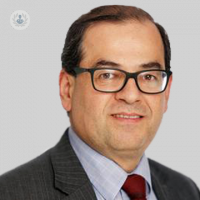When is knee replacement surgery needed to treat knee osteoarthritis?
Written by:We recently spoke to highly skilled and proficient orthopaedic surgeon, Mr Ahmad Ali, to quiz him on knee osteoarthritis, including how it develops, what the symptoms to watch out for are, and when knee replacement surgery comes into the picture as an effective treatment option for the patient’s knee osteoarthritis.

How exactly does knee osteoarthritis develop?
As we age, our cartilage can wear away naturally. Also, damage can occur prematurely due to infection or trauma. When this occurs naturally, as part of the ageing process, it is known as osteoarthritis.
As this cushioning cartilage thins, the knee begins to receive less protection against shock, and the bone ends can become injured by day-to-day activities such as walking. The underlying bone can become inflamed, which in turn can produce aching pain and stiffness.
What are the main symptoms of knee osteoarthritis?
There are, unfortunately, quite a few symptoms of knee osteoarthritis. The main ones include the following:
• aching pain within/around the knee
• occasional swelling
• stiffness after activity
How is knee osteoarthritis treated?
It is preferable that osteoarthritis is treated conservatively (without surgery) for as long as possible. However, the need for replacement of the joint may ultimately become inevitable, due to deterioration in the condition of the joint, leading to increased disability and pain.
Conservative (non-invasive) treatment of knee osteoarthritis involves a combined approach, including adequate pain management, weight loss, and physiotherapy. Hopefully, with conservative management, patients can delay the need for surgery for many years after the onset of arthritis in the knee.
What does knee replacement surgery involve?
Knee replacement surgery, like all joint replacement surgery, is a very major operation and requires careful consideration and discussion before proceeding. If, however, the patient and surgeon have come to the decision that there is no other alternative, replacement surgery can offer immense symptomatic relief to the patient.
The aim of knee replacement is to replace (re-surface) the deficient joint surfaces with low friction artificial surfaces. The best outcome is, in general, achieved by restoring mechanical alignment and soft tissue balance.
Knee replacement surgery can be divided into total knee replacement surgery or partial knee replacement surgery. In both cases, the operation is carried out under general or regional anaesthesia (spinal), and lasts approximately between one to two hours.
Total knee replacement surgery involves the replacement of all aspects of the joint with an artificial bearing surface. Surgery restores the normal alignment of the joint, as well as the smooth articulating surface that has been damaged by osteoarthritis.
Mr Ahmad Ali is a highly esteemed Brentwood and London-based orthopaedic surgeon. Consult with him today via his Top Doctors profile if you are considering knee replacement surgery as a treatment option for your knee osteoarthritis.


